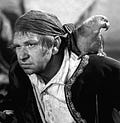When you mumble as much as I do, the potential for being misheard is significant... If you like to follow conversational tangents as much as I do, that isn't always a bad thing.
A few days ago, discussing the Steven Johnson book, The Enemy of All Mankind, about the origins of piracy, and the repercussions for democracy, enterprise and more, the person I was speaking to at first thought I was talking about a book on parrots, not pirates... This wouldn't be unusual. Some of my favourite books are on starting points as seemingly innocuous as rust, feathers, pencils, pigs, or sand - each of them using their pivot point as a perfect fulcrum for design, politics, history and more... However, the things I was attributing to pirates - democracy, socialism, tabloid media, and more - did raise an eyebrow while she thought I was talking about parrots.
Of course, I did come away from the conversation thinking about how our organisations prefer parrots to pirates - visions and plans echoed by everyone, instead of a group of dangerous individuals banded together by a common goal.
Steven Johnson's tale of Henry Every and his subsequent impact on economies and world trade elegantly points out how well organised a pirate ship needed to be - which might seem counterintuitive. If the individuals are not to be trusted as individuals, the organising principle needed to be strong and consistent. Out of that principle emerged interesting ideas, such as a very low level of inequality between the captain and the lowest paid (at most, 2 to 1, but often much less - a subject that is much discussed today with the gap between CEO pay and the lowest paid in the organisation), about ways that democracy emerged, with everyone on the ship having a vote, and more.
However, there is danger. If the pirates are on your side (and they often were, at least originally, sponsored for their efforts), that is good. If they weren't, or if they didn't trust you, bad things could happen. So piracy often began to exist outside of the empires. Kings and governments preferred the comfort of people who'd do what they were told, rather than the risk of the pirate ship - in effect, parrots not pirates.
Wind forward to today, and we see the same in corporations - slice through most of our pharma companies, and you'd expect to see people giving the same message, parroting the monoculture, safely tethered to the leadership. Who would tolerate pirates in their organisation, or even aligned to the mission? Very few... And that is why we get people leaving for biotechs, or their own start-ups - the ecosystem of South San Francisco biotechs versus the Genentech mothership. As with the pirates, the opportunity for personal gain is significant - steady and predictable when working for the king, or unpredictable but with potential for great upside with the pirates...?
A friend referred to the common problem of biotechs recruiting senior people from large pharma (often who've become senior by staying in one company for a long time): her analogy was of lions who've grown up in a zoo looking at life in a pride on the savannah and assuming that their zoo skills would be transferable - even stranger is that the biotech on the savannah keeps making the same mistake and breaks out yet another lion who's only known one way of life, and a comfortable, well-fed one, at that, and gives them a senior role... ("Big pharma vet recruited for startup..." is a frequent headline.) Recruiting parrots into a pirate life rarely works.
Unfortunately our organisations probably need the spirit, the agility, the success rates, of the pirate ships, rather than monocultures of people who say what they're taught to say - one puts all of the emphasis on leadership being right, and handing down the right words, whereas the other has a self-organising principle towards more micro-goals. That more closely reflects our environment in pharma - micro-goals more accurately describe 'this drug in this indication' instead of 'all of our drugs, treated the same way', letting teams focus entirely on their own campaign instead of being managed from the centre.
Unfortunately, organisational change is hard to do in steps - version 1.1 of an organisation may be in the right direction, but not enough to break out from the original. One idea might be the skunkworks, the pirate ships that are tolerated to get things done that the king's ships never will.
(For more on why we think pirates kept parrots, it's mostly fictional, but not random: this article describes more on the parrot trade in the 18th century...)



This one hit close to home, Mike! I’ve been a part of 2 skunkworks teams inside larger organizations. In both cases they did what they were designed to do (create the kinds of products, services and culture that that parent - or is that PARROT? - organization was unable to). And in both cases, they were killed by the parent for ultimately not fitting in with the rest of the parrots. My personal experience tells me that it’s impossible for an organization to maintain a skunkworks over a long period without feeling as though they’re “losing control” and needing to dismantle it. Would it be better to form a skunkworks organization to perform a specific function, get paid off, then go away? Then it starts to feel like an agency or consulting engagement vs. something that’s truly part of a company. Have you seen this work well anywhere?